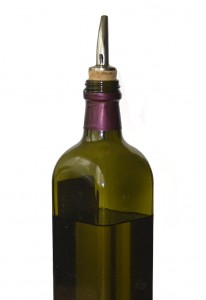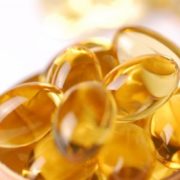New Year’s Resolution Tip Number Three
Increase Healthy Omega 3 Fats, Reduce Omega 6 Fats, and Eliminate Trans Fats Altogether
 Increasing your intake of polyunsaturated, omega 3 essential fats is one of the healthiest diet changes you can make, boosting your overall health by leaps and bounds.
Increasing your intake of polyunsaturated, omega 3 essential fats is one of the healthiest diet changes you can make, boosting your overall health by leaps and bounds.
Polyunsaturated fats (fats liquid at room temperature) are broken down into essential fatty acids (EFA). There are two groups of EFAs, Omega 6 and Omega 3 (DHA and EPA). Both omega 6 and omega 3 fatty acids are essential for optimal health.
There are many health benefits of omega-3 fatty acids. Research shows strong evidence that the omega-3s EPA and DHA can help lower triglycerides and blood pressure. And there are studies showing that omega-3 fatty acids may help with other conditions, including rheumatoid arthritis, poor immune function, inflammation, depression, and many other health challeges.
First Week of the Month Teleconference –
Tomorrow, FEBRUARY 4th, 2014 @7pm CST
Join me as I share how my patients are losing one-half to one pound per day on my Anti-Inflammatory Just Start Weight Loss Program! I will be going into detail and answering questions about the diet and how it works, as well as how my patients notice a drastic reduction in pain and a big lift in energy!
**SPECIAL CODE** will be given on the call for a $25 OFF discount, on top of the already discounted fee! So, join us, listen in, get your code, and get started with the program!
Register To Reserve Your Spot on the Call!
Omega 3 rich foods, green leafy vegetables, flax seeds, and cold water fish, boost natural anti-inflammatory hormones. Omega 3 foods reduce inflammation and disease processes. The main source of omega 3 fats, are deep cold water fish.
 Fish high in DHA and EPA omega-3 fatty acids include:
Fish high in DHA and EPA omega-3 fatty acids include:
- anchovies
- bluefish
- herring
- mackerel
- salmon (wild has more omega-3s than farmed)
- sardines
- sturgeon
- lake trout
- tuna
Many experts recommend eating these fish two to three times a week.
Good food sources of another oil, ALA — which is converted into omega-3 fatty acids in the body — include:
- walnuts
- flax and flaxseed oil
- canola oil
- olive oil
Unfortunately for many, genetic limitations prevent them from converting ALA foods into EPA. This is why I recommend everyone take a daily fish oil supplement.
Another way to increase your omega 3 levels is to supplement with pure fish supplements.
Fish Oil Supplementation
Rheumatoid arthritis. A number of studies have found that fish oil supplements [EPA+DHA] significantly reduced stiffness and joint pain. Omega-3 supplements also seem to boost the effectiveness of anti-inflammatory drugs.
- Depression. Research continues to show that cultures that eat foods with high levels of omega-3s, have lower levels of depression. Fish oil supplementation also seems to boost the effects of antidepressants. Fish oil may help reduce the “lows” in depressive symptoms of bipolar disorder.
- Prenatal health. DHA is vital for visual and neurological development in infants.
- Asthma. Evidence shows that a diet high in omega 3s reduces inflammation, a key component in asthma.
- ADHD. Several studies show that fish oil can reduce the symptoms of ADHD in some children and improve their cognitive function.
- Blood fat [triglycerides]. According to a number of studies, fish oil supplements can lower elevated triglyceride levels. Having high levels of this blood fat is a risk factor for heart disease. DHA alone has also been shown to lower triglycerides.
I recommend taking 2,000mg of pure fish oil or 1,000mg of Krill oil a day
 Alzheimer’s disease and dementia. The evidence is preliminary, but some research suggests that omega-3s may help protect against Alzheimer’s disease and dementia. Recent studies have also evaluated whether the omega-3 supplement DHA can slow the decline seen in those with Alzheimer’s dementia or in age-associated memory impairment. One recent study showed that DHA can be a beneficial supplement and may have a positive effect on gradual memory loss associated with aging.
Alzheimer’s disease and dementia. The evidence is preliminary, but some research suggests that omega-3s may help protect against Alzheimer’s disease and dementia. Recent studies have also evaluated whether the omega-3 supplement DHA can slow the decline seen in those with Alzheimer’s dementia or in age-associated memory impairment. One recent study showed that DHA can be a beneficial supplement and may have a positive effect on gradual memory loss associated with aging.
Omega 6 rich foods, whole grains, seeds, seed oils, and corn, are healthy in moderation. However, excess consumption of these foods, leads to excess production of arachidonic acid (AA) and eicosanoids.
AA is derived from the Omega 6 essential fatty acid foods (grains, flour, seeds, seed oils, corn, and grain-fed livestock), excess sugar, and trans-fatty acids. AA and eicosanoids create chain reactions that produce inflammation.
Arachidonic acid stimulates the production of inflammatory chemicals including leukotriens (notorious in causing allergic reactions), thromboxanes, and prostacylins. Several research articles have demonstrated that the more animal fats a human eats, the more arachidonic acid they have in their blood and cell membranes and the more likely to have inflammation. Conversely, a diet high in fish oils promotes less inflammation and a lower level of inflammatory chemicals.
Research shows that inflammation is the driving cause of many diseases including heart attack, asthma, stroke, chronic pain, arthritis, ulcerative colitis, menstrual pain, and recurrent headaches. Therefore, reducing chronic inflammation is the key to preventing and eliminating these illnesses.
Recently, a great deal of interest has been paid to the ratio of the fatty acids arachidonic acid (AA) to eicosapentaenoic acid (EPA), in omega 3 fatty acids. According to Dr. Barry Sears, author of Toxic Fat: When Good Fat Turns Bad, a lower AA/EPA ratio indicates a better balance of “good” and “bad” eicosanoids in your body. An AA/EPA ratio of less than 3 but not less than 1.5 is considered to be ideal.
The average AA/EPA of Americans is approximately 11:1. In patients with inflammatory conditions and neurological disorders, the AA/EPA ratio is 20:1 or more. An AA/EPA ratio of 1.5:1 is considered ideal. This is the ratio found in Japanese populations, which have the highest life expectancy and the lowest rate of cardiovascular disease.
Your goal should be to raise your omega 3 intake through diet and fish oil supplementation. And at the same time, to create a healthier EPA/AA ratio, you should reduce your intake of omega 6 foods. Reduce your intake of vegetable oils (use olive oil and coconut oils), grains, and grain fed livestock.
 Natural Oils Versus Refined Oils
Natural Oils Versus Refined Oils
Natural oils are derived from pressing seeds and nuts. These include sunflower, cotton, corn, olive, canola, and almond oils. Unsaturated fatty acids have one or more double bonds between carbon atoms in their chain. These naturally occurring CIS, or double bonds, allow non-animal fats to remain liquid at room temperature.
Refined oils undergo deodorization, bleaching, and a hydrogenation processes. These processes remove lecithin, beta-carotene, essential fatty acids, and the antioxidant vitamin E. Hydrogenation is the process of adding hydrogen atoms to polyunsaturated oils for the purpose of creating solid saturated fats like margarine. Natural oils are heated under pressure for six to eight hours at 248 to 410 degrees F and reacted with hydrogen gas by using a metal like nickel or copper, producing trans fatty acids. Both of these heavy metals are linked to mental depression and fatigue.
These naturally, unsaturated, CIS-containing fats, are poisoned by heating them up and hydrogenating the double CIS bond into the man-made trans fatty acid.
Trans fatty acids prevent the Omega-6 and Omega-3 essential fatty acids from attaching to their receptors on cell membranes. This makes the membranes, which regulate what goes into and out of a cell, impermeable. Because nutrients can’t get in and toxins can’t get out, the membranes begin to die.
Food labels with trans fatty acids will read as follows: partially hydrogenated, enriched (breads), made with one or more of the following oils, corn, safflower, cottonseed, or other vegetable or seed oils.
The American public has been misled into believing that vegetable oils are good for them. The American Heart Association, who unbelievably advocates the use of margarine, has promoted this. Margarine is made up of 15 to 50% trans fatty acids. Processed vegetable oils, devoid of healthy essential fatty acids, are primarily toxic, trans fatty acids in a bottle.
A Harvard study found that women who ate four or more teaspoons of margarine a day had a 50% greater risk of developing heart disease compared those who rarely ate margarine.
A two percent increase in trans fatty acid intake increases the risk of developing diabetes by 39%.
Individuals increase their risk of developing coronary heart disease by a whopping 25% for every two percent increase in trans fatty consumption.
 For healthy foods, look for labels that say “made from cold expeller pressed oils.”
For healthy foods, look for labels that say “made from cold expeller pressed oils.”
Avoid margarine, enriched breads, foods cooked with vegetable oils (unless they state “expeller pressed oils” or “no trans fats”), and hydrogenated or partially hydrogenated oils.
Use olive oil, coconut (my favorite) or canola oil to cook with. These oils can withstand a higher cooking temperature before turning into trans fats. I recommend you use extra virgin expeller pressed olive oil.
I’ll have more to say about the health benefits of coconut oil in a later blog.





Do you have vegetarian recipes in your inflammatory diet? I’m eager to adapt a recovery program through supplements and diet.
If you’ve not received the book call clinic 205-879-2383
What are your thoughts on combination butter oil/ fermented cod liver oil? I’ve slept full nights after taking it and my pain has lessened a bit. I’m not getting the cold and stomach viruses my students usually pass on to me also. Do I also need to take additional fish oil?
If it works great…..